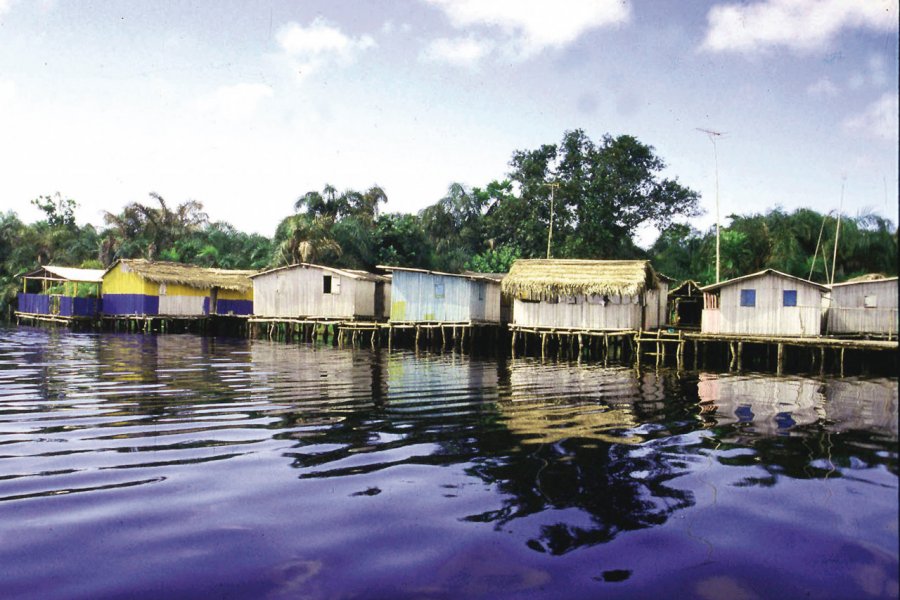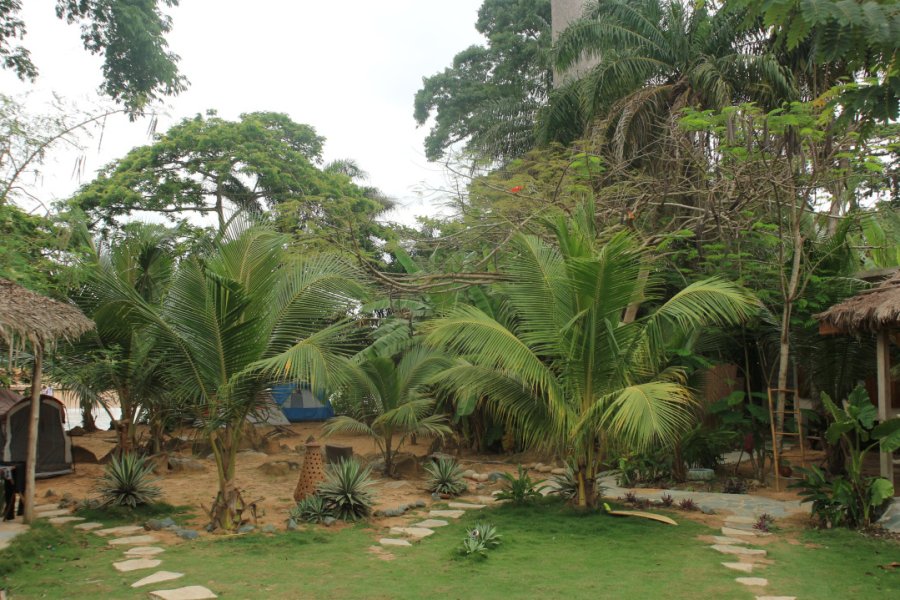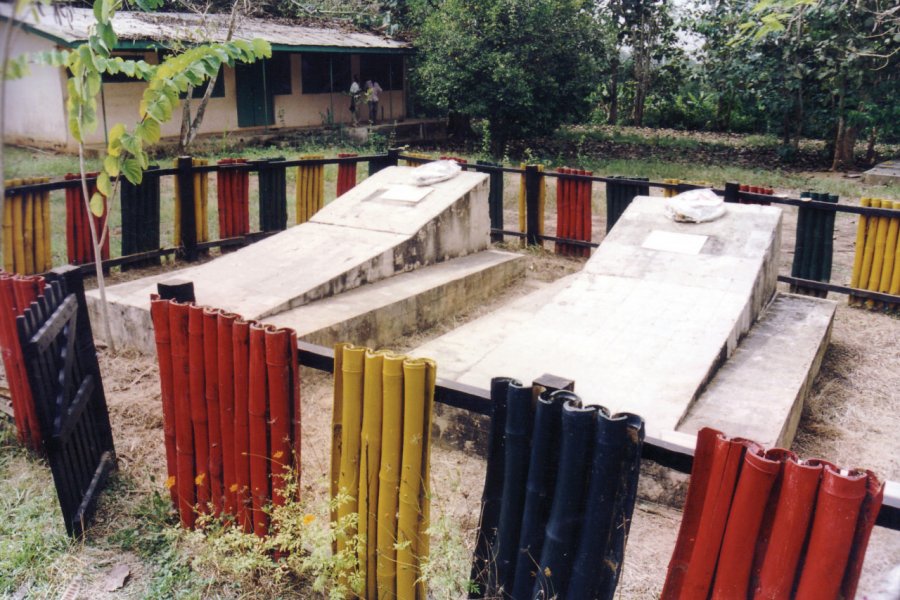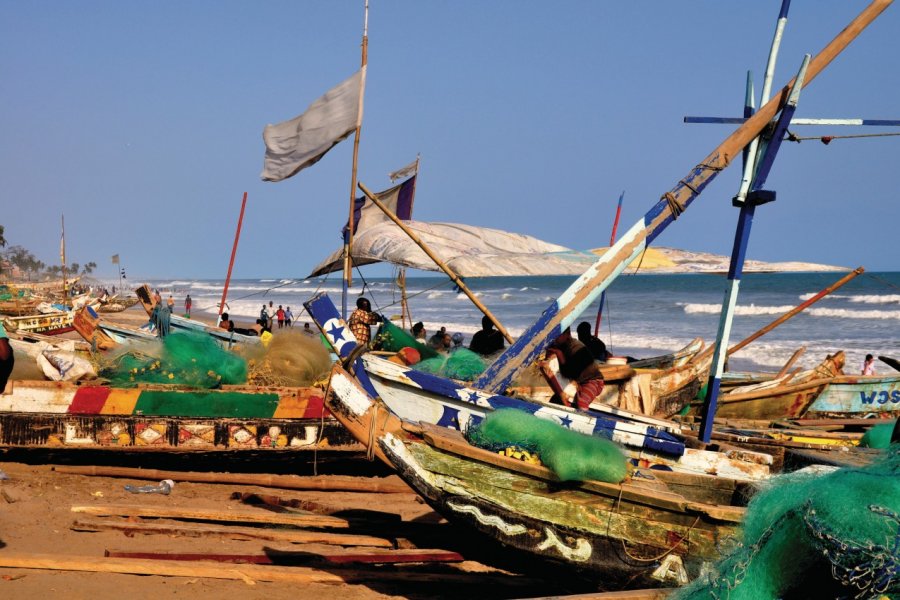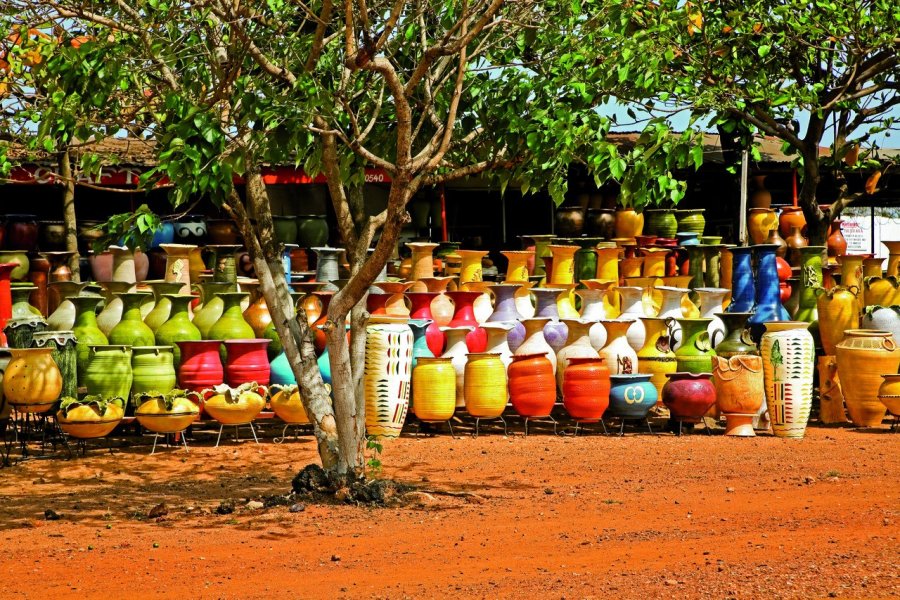Travel guide Ghana
Welcome to the travel guide dedicated to a destination that dances to the beat of its drums: Ghana. This nation stretches from the Atlantic coast to the edge of the Sahel. In the south, 15th-century forts tell the dark story of colonization and the slave trade, while in the north, the vast savannah stretches as far as Burkina Faso.
Nicknamed the "Gold Coast" for its rich gold resources, Ghana is also the cradle of Pan-Africanism. It was the first African country to gain independence in 1957. Its cultural richness is reflected in its music, cuisine and festivals, particularly in Ashanti country. Whether you're in Accra, the modern capital, or in the remote regions of the north, you'll find a mix of beliefs and practices, from Christianity tinged with animism in the south to Islam in the north.
Although little explored by French-speaking tourists, this country is one of the most accessible on the Gulf of Guinea. Its markets, notably Kumasi, the largest in West Africa, are microcosms of contemporary African life. Ghana is also a living history book, the pages of which are engraved in the forts and castles of the Gold Coast, such asElmina Fort andCape Coast Castle. They pay tribute to the resilience of the Ghanaian people.
Start your road trip with your feet in the golden sands of the Volta region's beaches. Stroll along stretches like Kokrobite that attract surfers and swimmers.
Then retire to Kakum National Park: its famous liana bridge invites you to flirt with the treetops of the rainforest. Fufu, jollof rice and kelewele offer a gastronomic experience in the restaurants. You'll also be moved by Ghanaian hospitality, which is the very soul of the country: Akwaaba means you're welcome. Ghana delivers unforgettable experiences that will change your view of the world!
What to see, what to do Ghana?
-
Book an activity
-
Customized travel
- The most beautiful cities Ghana
When to go Ghana ?
Ghana, land of gold, culture and sunny beaches! You may be asking yourself, "When to go to Ghana?"
The best time to go to Ghana depends on what you're looking for. If it's sun and beach that appeal to you, then January and February are the months of choice. The climate is dry, and you'll be able to enjoy the Atlantic Ocean without interruption. What's more, airfares are more affordable just after the festive season.
If you travel to Ghana in March or April, you'll find yourself in the middle of the dry season in the north, ideal for exploring the savannah and wildlife. On the other hand, be prepared for high temperatures!
The "when to go" in Ghana gets a little trickier between May and July: this is the rainy season. However, if you love nature, this is the time when everything is green. Accommodation prices also fall, which can be an advantage.
August and September in Ghana are the transition months. Rain is less frequent, and prices start to rise in anticipation of the high season.
October and November are excellent for culture lovers. You'll be able to attend various traditional festivals and understand the very essence of Ghana.
Finally, December! The festive season sees prices soar, but the atmosphere is electric, especially in Accra. So the best time to visit Ghana depends on your interests.
Suggested addresses Ghana
Travel Ghana
-
Find a hotel
-
Car Rental
-
-5% on travel insurance-15% off travel insurance
-
Find a local agency
Naturellement, au Ghana comme ailleurs, les possibilités d'itinéraires sont très nombreuses. Il y a toutefois quelques immanquables - comme un passage par la vibrante Accra - et des lectures thématiques du territoire à entreprendre. C'est pourquoi nous vous proposons ici quelques idées de séjours qui permettront à qui découvre le Ghana pour la première fois quelques étapes indispensables pour connaitre le pays. Également, nous avons élaboré quelques itinéraires thématiques. Le premier s'intéresse aux richesses naturelles du pays, et le Ghana n'en manque pas (plages, reliefs, zones lacustre, déserts, parcs, etc) ; la seconde explore un pan moins léger de l'histoire du pays : celui de la traite des esclaves, le Ghana ayant été l'un des points d'envoi d'esclaves principaux durant des siècles. Et les vestiges construits - principalement des forts, tout le long du littoral - continuent de raconter cette histoire.
Find unique Stay Offers with our Partners
How to go Ghana
How to go alone
Going alone in Ghana is an exhilarating adventure. The first step is, of course, planning: make sure you have all the necessary documents, including a visa and up-to-date vaccinations. Then book a flight to Accra, the country's capital and main point of entry.
On the ground, Ghana is an ideal destination for solo travellers, thanks to its welcoming people and geographical diversity. What's more, it's one of the safest countries in West Africa. Finally, learn a few phrases in Twi, one of the local languages.
How to go on a tour
If the idea of planning every detail of your trip to Ghana seems daunting, opting for an organized tour is an excellent solution. This type of holiday allows you to benefit from the expertise of local guides, a well-thought-out itinerary and the handling of logistical aspects such as accommodation and transport.
A tour package to Ghana includes visits to the country's main points of interest, such as the historic forts of the Gold Coast, the modern city of Accra and nature reserves. You'll also have the opportunity to discover Ghana's rich culture through workshops, local markets and interactions with locals. Last but not least, you'll travel in complete safety, especially if you're a solo traveler or if it's your first time in West Africa.
How to get around
The excitement starts as soon as you step off the plane! In metropolises like Accra, "trotros" - colorful minibuses - are the pulse of the city. They allow you to immerse yourself in the local culture for a handful of cedis!
If you want to travel in style, long-distance buses offer luxury services with reclining seats, air conditioning and even Wi-Fi. And if you're in a hurry, domestic flights to key destinations like Kumasi or Tamale are a breeze.
For those who like flexibility, cabs offer a tailor-made travel option. Always remember to negotiate the price in advance - it's almost a tradition here! Venture into rural areas to try out the joys of motorcycle cabs. Finally, if you're the independent type, renting a car might be your best bet.
Featured articles Ghana
Discover Ghana
In this section of the guide, we offer a brief, cross-sectional presentation of Ghana. Whether you already know the destination or not, you're sure to learn something here. Ghana's history is fascinating and tragic in many respects, and this is what the chronological dossier presented here aims to highlight in far fewer lines than is really necessary. Geography is also addressed: Ghana's territory, which varies considerably from north to south, from desert to beaches, via the fertile plains of Ashanti country and the Volta basin, is home to a flora and fauna that are well worth encountering. Other aspects of the country are developed: culture, arts and crafts, lifestyles, religion, gastronomy... In short, this is a general portrait of Ghana that will ensure that would-be travelers don't arrive knowing nothing about the destination... and perhaps even inspire them!
Pictures and images Ghana
The 12 keywords Ghana
1. Sea baths

As opposed to river bathing, which is not recommended due to bilharzia (a parasitic disease). The good news is that, on the ocean side, the beaches are clean and there are many recommendable spots, such as Fetteh (Winneba). If the ambient heat invites you to go for a swim, be careful: the sea can be dangerous.
2. Business
All men would like to do it in Ghana. On both sides of the country, they are there, ready to negotiate prices, for their friends, for themselves, to arrange a tourist... In short, to do business. In this field, the ultimate goal for Ghanaians is to do import-export to get foreign currency and earn a lot of money.
3. Chop

Chop (chop-chop or chop-restaurant) is an expression used to designate small maquis where ready-made food is available to the customer. Chop literally means "to gobble". It is more about filling the stomach than enjoying a good meal. This word could refer to the French expression "casser la croûte".
4. Currency
A single motto to remember: "Freedom and Justice". Ghanaians often come up to tourists and proclaim how free their country is, and how you can do anything. Ghanaians are very proud of their homeland. The national flag can be seen everywhere, especially in Accra on the main roads.
5. Hapusskéléké
Hapusskéléké is the name given to young women wearing tight jeans. The word came from a highlife song, the refrain of which was "hapusskéléké ta monnaie peut finir, la chose sera toujours là...". The song's main subject was young women dressed up to go out, wearing tight pants in particular.
6. Highlife
Highlife is based on traditional rhythms mixed with the sound of guitars and more modern bass. This typically Ghanaian music is also the most popular, and people listen to it all day long, even though more modern, electronic sounds are gaining ground, especially among Ghanaian youth.
7. Kotoko
Fabruos! is the winning cry of the fans of the Ashanti soccer team from Kumasi, known as Kotoko. Ghanaians are completely crazy about soccer. On the cabs, red and white are the colors symbolizing the Kotoko fans. While red, blue and yellow are the colors of Hearts, their opponents in the capital.
8. Nana
Nana means descended from a chief's family. In some parts of Ghana, it is also an honorary title given by the inhabitants of a village to a person involved in its development. Rita Marley, for example, through her donations to the Aburi community, has become a Nana almost as respected as a traditional chief.
9. Nite Clubs

Night Clubs", spelled the Ghanaian way, are the place to be for the youth of Accra and the urban areas of Ghana. The sound systems raise their decibels very high, the music lasts until the early morning, and this on Friday, Saturday and Sunday nights every week! On the menu: hip-hop, highlife, afro music and reggae!
10. Obroni
Obroni is a generic term for white people, or anyone who does not have two black parents. Visitors are likely to hear it often! In the Volta region, Yovo will also be a common alternative. But White Man is more commonly heard. Note that mixed-race people are also considered obroni.
11. Gold

Although "Gold Coast" was once the country's name, it's hard to find any trace of this glorious past today. Events - such as the Ogua Fetu Afahye (Cape Coast) or the Asantehene (Kumasi) receptions - keep this heritage alive, and a few mines remain (Tarkwa and Obuasi), but visiting them is almost impossible.
12. Pure Water
It's impossible to travel in Ghana without hearing dozens and dozens of times a day, street vendors, often young women, shouting " pure wata ". These are 25 cl plastic sachets containing water. This water is supposed to have been treated against bacteria, but quality varies between brands.
You are from here, if...
You are as respectful as possible of the rules. Politeness, rules of the road, various regulations... These codes strongly govern Ghanaian society, and people are very attentive to the behavior of foreigners. Show your best side - you're representing an entire country (your own)!
You don't photograph people without their prior consent.
When visiting a village, you ask to meet the chief. It's customary to pay your respects to traditional bodies. This way, you win the favor of the whole village.
Smoking is frowned upon in Ghana. Very few people smoke, and you know that if you do, you'll meet with general disapproval. If you are a smoker, smoke outside and make sure you don't inconvenience anyone.
You don't hesitate to haggle when given a price in markets, cabs and street vendors. Apart from fixed prices (hotels, restaurants or stores), foreigners are often offered much higher prices.

